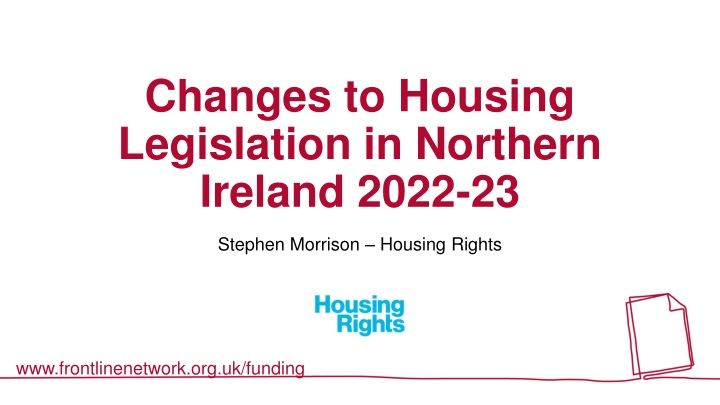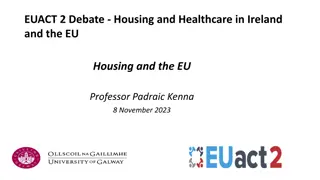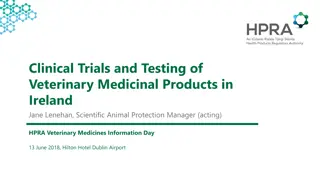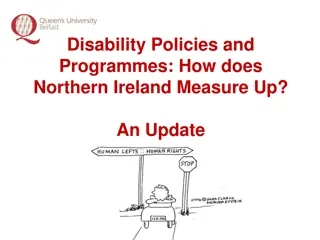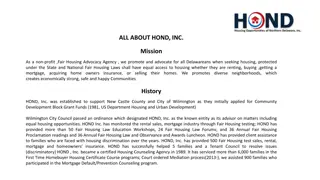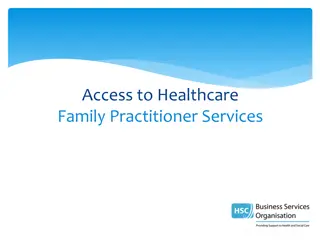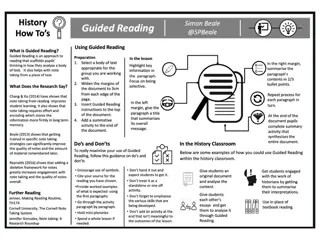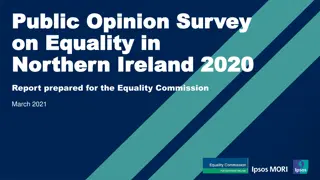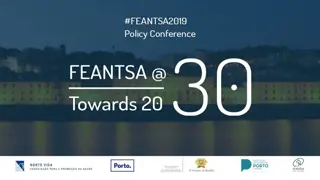Changes to Housing Legislation in Northern Ireland 2022-23 Summary
Key changes in housing legislation in Northern Ireland for 2022-23 have been outlined, including the Private Tenancies Act and challenges faced in the current context. The Private Tenancies Act introduced significant reforms to the private rental sector, such as the issuance of Tenancy Information Notices. However, the housing sector in Northern Ireland continues to struggle due to lack of government, insufficient social housing, rising rent prices, and budget cuts.
Download Presentation

Please find below an Image/Link to download the presentation.
The content on the website is provided AS IS for your information and personal use only. It may not be sold, licensed, or shared on other websites without obtaining consent from the author.If you encounter any issues during the download, it is possible that the publisher has removed the file from their server.
You are allowed to download the files provided on this website for personal or commercial use, subject to the condition that they are used lawfully. All files are the property of their respective owners.
The content on the website is provided AS IS for your information and personal use only. It may not be sold, licensed, or shared on other websites without obtaining consent from the author.
E N D
Presentation Transcript
Changes to Housing Legislation in Northern Ireland 2022-23 Stephen Morrison Housing Rights www.frontlinenetwork.org.uk/funding
Key Changes in the Past 12 Months Private Tenancies Act (Northern Ireland) 2022 Tenancy Information Notice Notice of variation Notice regarding past matters Issuing of receipts Limit on tenancy deposit amount Exceptions to notice periods Future regulations Fundamental Review of Allocations Overhaul of the selection system for social housing in Northern Ireland Followed independent research, partnered with Northern Ireland Housing Executive (NIHE) and Housing Associations Consultation with public and stakeholders on recommendations for change www.frontlinenetwork.org.uk/funding www.frontlinenetwork.org.uk/funding
Current context and Challenges Northern Ireland has not had a functioning government since February 2022. Therefore, there has been no new policy or legislation introduced since this date. Housing need not being met. Not enough social housing being built, and this has been reduced further in this year s budget. Overwhelmed and shrinking Private Rental Sector with increasing barriers to access. Average rent has risen 10% in the last year. Average monthly rent risen approximately 150 since April 2021. Welfare has not risen alongside this increase. Local Housing Allowance has remained frozen since 2020. Discretionary Support has a projected need of 45 million, with only 20 million allocated. The Northern Ireland Secretary of State, Chris Heaton-Harris, has imposed a deeply damaging budget on Northern Ireland, resulting in cuts across the public sector, including housing and support for those in housing need, as well as the most vulnerable in Northern Ireland society. www.frontlinenetwork.org.uk/funding
The Private Tenancies Act (Northern Ireland) 2022 (PTA) Passed by the Northern Ireland Assembly in April 2022, but came into force in April 2023. Had a truncated scrutinization process due to the collapse of the Executive and the approaching conclusion of the mandate. Important but imperfect piece of legislation which made several changes to the private rental sector and private rental tenants. Intended to be the first in a series of legislative reforms of the private rental sector. www.frontlinenetwork.org.uk/funding
Tenancy Information Notice A landlord must provide a tenant with a tenancy information notice (TIN). A TIN provides the landlord and tenant with information on their respective rights and responsibilities. Will contain information such as rent payable, deposit details, duration of tenancy, responsibility for repairs and notice to quit. Also provides tenants with the landlord s name and contact information. Landlord must provide the TIN within 28 days of granting the tenancy and it must be free of charge. www.frontlinenetwork.org.uk/funding
Landlords Notice relating to the variation of a Private Tenancy Also known as a Notice of Variation Regulations require the landlord to provide the tenant with a notice of variation if there is any change to the information contained in the original tenancy information notice. The new notice must contain the address of the dwelling house, the provision to be varied and the new provision. Landlord must provide a notice of variation within 28 days of any changes made and the notice must be free of charge. www.frontlinenetwork.org.uk/funding
Notice regarding past matters Since 2011, there was no legal duty to provide tenants with information relating to their tenancy. This notice applies to tenants who did not receive such information since 2011 and are still in a private tenancy as of 1 April 2023. The landlord must provide a free notice detailing these past variations free of charge. Tenants should have been given this notice within 28 days of 1 April 2023. A landlord who fails to give the required Tenancy Information Notice or Notice of Variation within the required 28-day period is guilty of an offence under the PTA. www.frontlinenetwork.org.uk/funding
Receipts It is now a requirement for a landlord to provide a written receipt for any payment made in cash in relation to a tenancy. (rent payment, arrears, deposit) Any written receipt must detail: The payment date What the payment was for The amount paid including If any amount remains outstanding If the payment was made in full Must be provided free of charge and be in written form. A landlord must provide the receipt at the time the payment is made. In exceptional circumstances, the tenant and the landlord can agree a reasonable timeframe. It is an offence if a landlord fails to provide a receipt, if the receipt does not contain the correct information or if the receipt is not provided as soon as is reasonably possible. www.frontlinenetwork.org.uk/funding
Limit on Tenancy Deposit Amount Under the PTA, a Landlord cannot ask for or retain a tenancy deposit that is more than one month s rent. The amount of the deposit required should not be more than the equivalent of one month s rent. Where the rent is payable for periods other than whole months rent, the deposit will be the amount of 1 day s letting x30. If a tenant agreed to pay a deposit of more than 1 month s rent after 1 April 2023 and this is not paid, the landlord can only recover the amount equivalent to one month s rent. If a tenant signed a contract to pay a deposit more than 1 month s rent before 1 April 2023, the landlord can ask for that deposit and the tenant is contractually obliged to pay it. www.frontlinenetwork.org.uk/funding
Increase in time for requirements relating to tenancy deposits The time limit for a deposit to be protected in an approved scheme has changed from 14 to 28 days. If a landlord receives a tenancy deposit, they must comply with the initial requirements of an approved scheme within 28 days beginning with the date the deposit was received. The landlord has additional time to provide the prescribed information to the tenant, changing from 28 to 35 days. The landlord must provide the tenant with the required written information within 35 days of the deposit being paid. www.frontlinenetwork.org.uk/funding
Removal of 6-month time barrier to prosecution of tenancy deposit offence An offence is committed where a landlord fails to protect a tenancy deposit or give the prescribed information within the required time. The PTA makes the failure to protect a tenancy deposit a continuing offence and removes the 6-month time limit on prosecutions. www.frontlinenetwork.org.uk/funding
Future Regulations The PTA affords the Department for Communities the powers to introduce new regulations regarding the following: Energy efficiency of dwelling houses under a private tenancy Electrical safety standards Notice to quit periods The Department have just finished consulting on longer notice to quit periods which would be accompanied by exceptions allowing these to be shortened under certain circumstances. www.frontlinenetwork.org.uk/funding
Fundamental Review of Allocations In 2013, the Department for Communities (DfC) began a review of ways to improve how social tenancies are allocated in Northern Ireland. This required a fundamental review of the Housing Selection Scheme. The Housing Selection Scheme is a set of rules that have been in place since 2000. The Northern Ireland Housing Executive (NIHE) and Housing Associations use these rules to award selection scheme points and to allocate social tenancies. The Fundamental Review of Allocations (FRA) began with a period of consultation before implementing any changes. www.frontlinenetwork.org.uk/funding
FRA Consultation Period The first stage of FRA involved: Independent research into the Housing Selection Scheme Working with the Housing Executive and Housing Associations to identify potential changes Consultation with the public and stakeholders on recommendations for change Twenty proposals for change were identified and went out for public consultation in 2017. The Minister for Communities agreed that 18 of the 20 proposed changes would go ahead. Two of the proposals were held for further investigation Intimidation points Interim accommodation points www.frontlinenetwork.org.uk/funding
FRA Recommendations: Group 1 Group 1 of the FRA recommendations was rolled out at the end of January 2023. All four of the recommendations are now operational: Proposal 1: An independent, tenure-neutral housing advice service for Northern Ireland Proposal 5: A greater choice of areas for all applicants for a social home Proposal 15: An applicant may receive two reasonable offers of accommodation Proposal 16: Social Landlords may withdraw an offer of accommodation in specified circumstances. www.frontlinenetwork.org.uk/funding
FRA Recommendations: Group 2 Group 2 Proposals are being rolled out between February 2023 and December 2023: Proposal 6: Greater use of the mutual exchange service Proposal 12: For difficult-to-let properties, social landlords should be able to make multiple offers to as many applicants as they think is necessary. Proposal 14: For difficult-to-let properties, social landlords should be able to go direct to multiple offers if they have evidence a property will be difficult to let. Proposal 17: Social landlords may withhold consent for a policy succession or assignment to a general needs social home in limited circumstances where there is evidence an applicant needs it Proposal 18: Social landlords may withhold consent for policy succession or assignment of adapted accommodation or purpose-built wheelchair standard accommodation where there is evidence an applicant needs it. www.frontlinenetwork.org.uk/funding
FRA Recommendations: Group 3 Group 3 is due to be rolled out between January 2024 and October 2024: Proposal 2: An applicant who has been involved in unacceptable behaviour should not be eligible for social housing or Full Duty Applicant homeless status unless there is reason to believe at the time the application is considered that the unacceptable behaviour is likely to cease. Proposal 3: The Housing Executive may treat a person as ineligible for Full Duty homelessness status on the basis of their unacceptable behaviour at any time before allocating that person a social home. Proposal 19: Update the Selection Scheme to bring it in line with developments in Public Protection Arrangements in Northern Ireland. www.frontlinenetwork.org.uk/funding
FRA Recommendations: Group 4 Group 4 is due to be rolled out between November 2024 and April 2025: Proposal 4: The Housing Executive can meet their statutory duty to homeless people on a tenure- neutral basis; provided that the accommodation meets certain conditions. Proposal 7: Investigate how to strengthen the verification process and address inconsistencies in the award of intimidation points. Proposal 8: Points should reflect current circumstances of all applicants. Proposal 9: Investigate alternative approaches for the award of points to applicants in any form of temporary accommodation. Proposal 10: The Selection Scheme should place applicants into bands based on similar levels of need to meet longstanding housing need more effectively. Proposal 11: The Selection Scheme rules should generally align the number of bedrooms a household is assessed to need with the size criteria for eligible Housing Cost element of Universal Credit/Housing Benefit customers. Proposal 13: For difficult to let properties: Social landlords should be able to use choice-based lettings. Proposal 20: For difficult to let properties: Social landlords should be able to use choice-based lettings. www.frontlinenetwork.org.uk/funding
